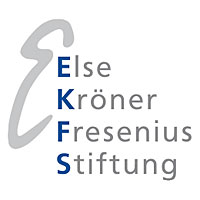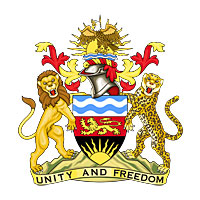Become our partner
About Us
“Millions of people around the world are in need of eyeglasses but cannot afford to buy them or simply have access to them. Children are unable to learn, adults struggle to provide for their families. We would like to do something about it. Our vision is a world where everyone can have access to affordable eyeglasses to reach his or her fullest potential.”
Martin Aufmuth, Founder and Chairman OneDollarGlasses

Who we are
GoodVisionGlasses is a brand of OneDollarGlasses, an international social business headquartered in Germany, Europe, and founded by Martin Aufmuth in 2012. He invented an impact-focused innovative approach to producing quality, low-cost eyeglasses for a developing or emerging country context. Those eyeglasses are made of spring-steel wire frames and prefabricated clip-in lenses. The material cost: about 1 US$. Correspondingly, the organisation was named “OneDollarGlasses”.
Currently, OneDollarGlasses is active in eight countries in Africa and South America. Globally, more than 350 individuals are involved in OneDollarGlasses. Till the end of 2017, the organisation had supplied eyeglasses to more than 100.000 people.
OneDollarGlasses came to Malawi in 2014 and has since operated through its CONGOMA-registered subsidiary OneDollarGlasses Ltd., producing and distributing eyeglasses under the brand GoodVisionGlasses. So far, more than 18.500 eyeglasses have been distributed in Malawi, many as donations.
Meet the Team
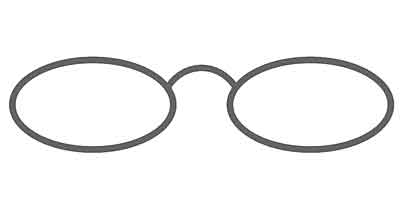
Frank Mbewe
Chairman of the Board
A renowned cataract surgeon based in Zomba Central Hospital and Coordinator for the Ophthalmic Outreach for South East Health Zone for the Ministry of Health with a catchment population of over 3 million.
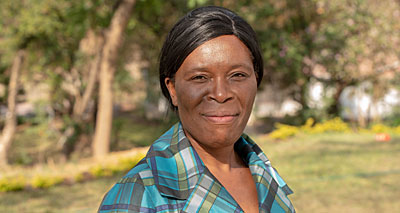
Agness Nkhoma
Area Operations Manager for Southern Malawi
A Chartered Marketer with over 16 years´ work experience in the research industry and telecommunications sector with changing management roles.
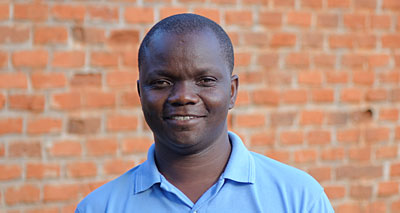
Lawrence Munthali
Impact and Sales Manager for Central and Northern Malawi
A sales and fundraising expert who served for 19 years with the international NGO DAPP and brings a vast range of commercial experience to GoodVisionGlasses.
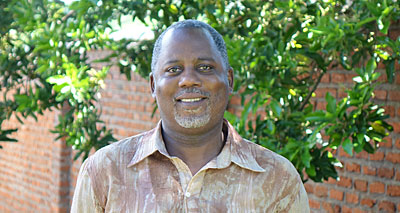
Elton Coresch Mazengera
Community Outreach Coordinator
An expert in social community marketing who worked for over 13 years with Banja La Mtsogolo (BLM) and Population Services International (PSI) before joining GoodVisionGlasses.
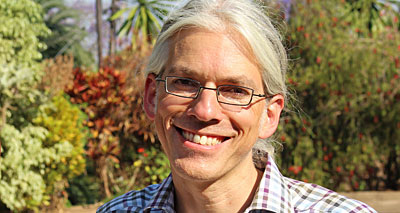
Martin Aufmuth
Founder and Chairman of OneDollarGlasses
In 2012, the former teacher from Germany invented an impact-focussed technique for producing quality low-cost eyeglasses suitable for a developing and emerging market.
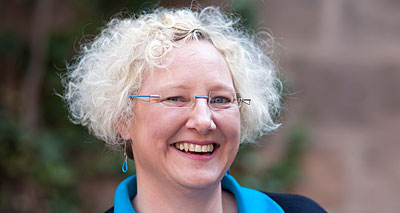
Silke Weinmann
Head of International Projects
A highly experienced international manager who worked for many years in intercultural contexts, Silke coordinates the African operations of OneDollarGlasses.
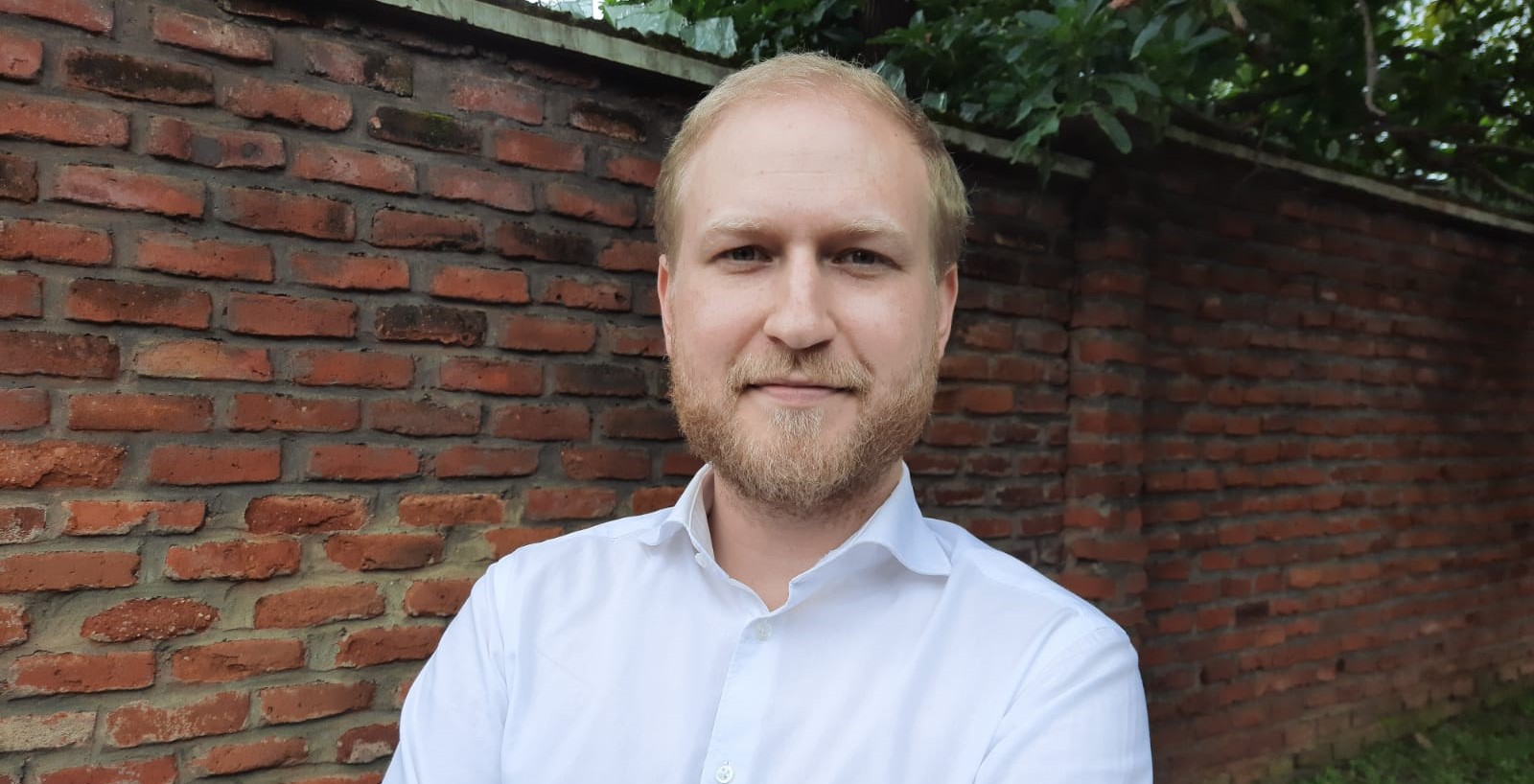
Marc Zedler
Project Manager Country Development
Business Development and operations manager with extensive experience in Africa. Managed teams from diverse professional backgrounds in overseeing company; resources, policies, goals, communications, financing, and execution.
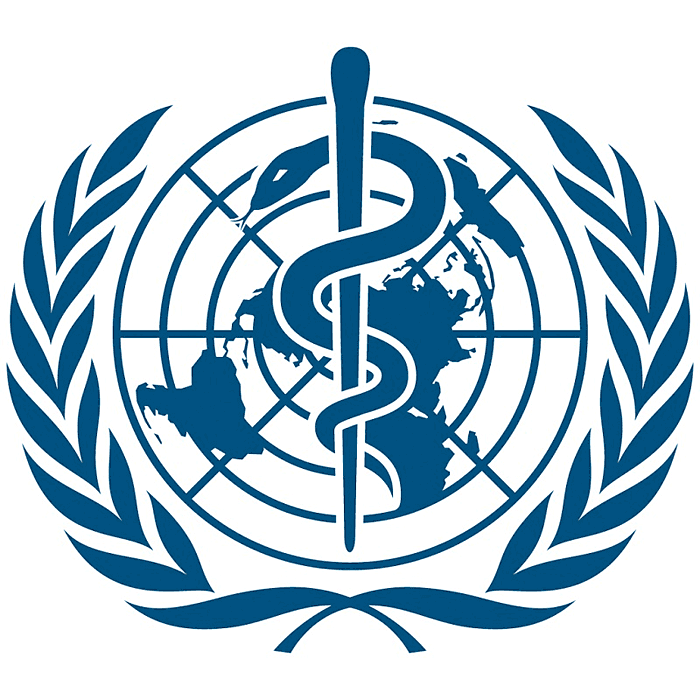
A GLOBAL PROBLEM
According to the World Health Organisation (2018), it is estimated that globally approximately 1.3 billion people live with some form of distance or near vision impairment. Many of these individuals either lack the financial means to buy glasses or simply do not have access to them. Ramifications are children who struggle to learn in school and adults unable to work properly and provide for their families. Worldwide, lost income due to these circumstances amounts to about 202 billion US$ per year (World Health Organisation 2012).
Another study co-published by our partner VisionSpring in July 2018 in The Lancet Global Health furthermore affirms that eyeglasses have the potential to dramatically boost worker productivity worldwide.
In India, providing tea pickers with corrective lenses improved worker productivity by 21.7 percent, with productivity increasing to almost 32 percent when vision correction was provided to workers over 50. This represents the largest ever recorded productivity increase from any health intervention.
How we operate
The Glasses
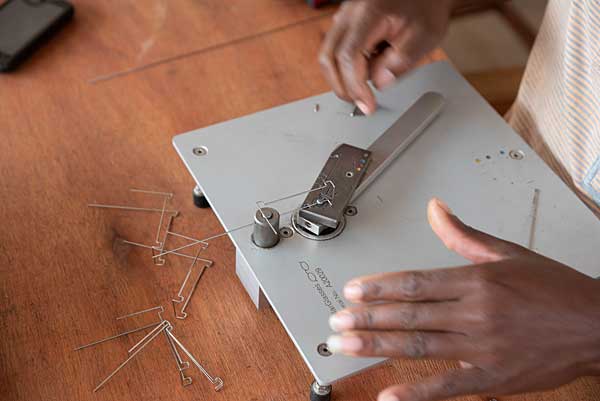 The eyeglasses invented by OneDollarGlasses’ founder Martin Aufmuth in 2012 and marketed as the product line „GoodVisionGlasses“ in Malawi consist of a lightweight, flexible and very durable metal frame which uses hypo allergic spring-steel wire sourced from Germany.
The eyeglasses invented by OneDollarGlasses’ founder Martin Aufmuth in 2012 and marketed as the product line „GoodVisionGlasses“ in Malawi consist of a lightweight, flexible and very durable metal frame which uses hypo allergic spring-steel wire sourced from Germany.
The metal frames are manufactured on a custom-made bending machine, which is virtually maintenance free and requires no electricity. They come in differently coloured temples, sizes and account for varying pupil distances. The spherical lenses sourced from China, but quality checked in Germany, are prefabricated clip-in lenses, made from hardened polycarbonate and available in diopters ranging from -10 to +10. The cost of the material including wire and lenses comes to about 1 US$.In Malawi, the most basic „GoodVisionGlasses“ model is sold at 6.000 Kwacha only.
Furthermore, since 2019 there is a strategic partnership with US-based VisionSpring (www.visionspring.org) in order to be able to offer plastic frames which follow the same modular system approach as the metal frame „GoodVisionGlasses“.
The Training
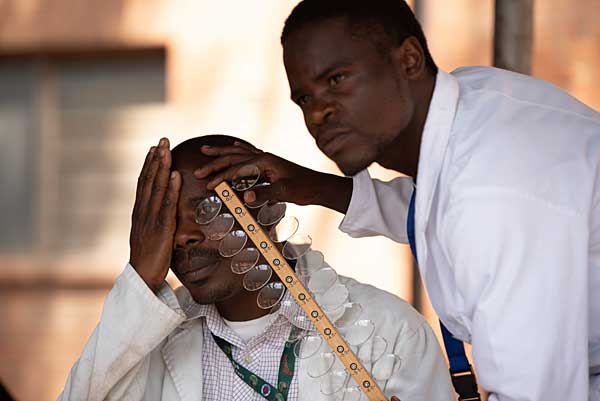
In cooperation with German ophthalmologists and opticians, OneDollarGlasses developed its own 12 month long highly focussed training course in Best-Spherical-Correction (BSC).
In Malawi, experienced opticians and optometry technicians have so far educated 30 „GoodVisionOpticians“ in finding the appropriate lenses during vision testing as well as professionally fitting the glasses. To sum it up: Best-spherical correction of refractive error ONLY - no treatment of eye diseases.
A well designed quality control system with strict supervision components guarantees compliance with quality standards.
The Distribution
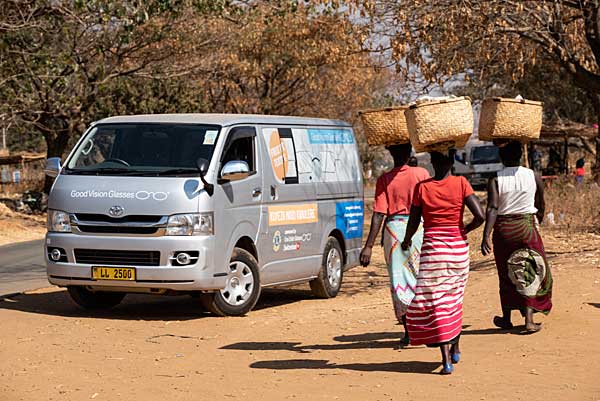
Distribution takes place via own GoodVisionStores as well as outreaches conducted by mobile outreach teams.
The modular assembly system of the eyeglasses offered by GoodVisionGlasses allows for fast, individual and cost effective care, also in remote areas. Immediately after the eye test (always provided at no cost), the patient who is willing to buy and able to pay, receives the glasses. No expensive grinding equipment is needed and a second consultation for fitting the glasses is not required, thus saving time and transport costs.
The growing network of own GoodVisionStores and an increasing number of partnerships supporting repetitive outreach scheduling (e.g. at local health clinics) allow customers to access after-sales services or to purchase (again) at a later point in time.
The Social Business
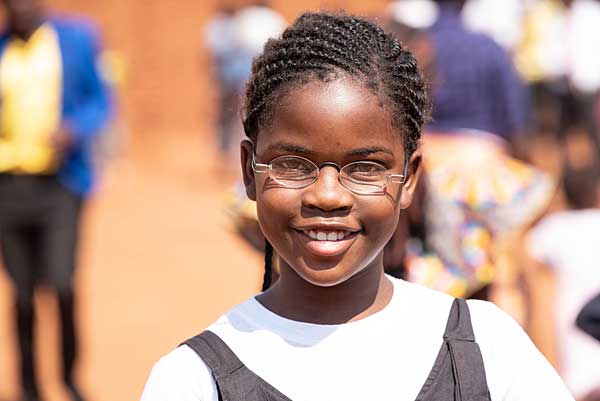 OneDollarGlasses is operating internationally as a social business. This means first and foremost that the aim is to merely cover costs, not to make profit.
OneDollarGlasses is operating internationally as a social business. This means first and foremost that the aim is to merely cover costs, not to make profit.
This approach enables us to offer our products at a lower price compared to profit-seeking businesses. By this we can live up to our conviction that a good vision is a human right and thus eyecare services in developing and emerging countries a social obligation.
At the same time, and in contrast to a classical not-for-profit organisation, cost-covering will enable us to be self-reliant in the countries we work in, i.e. largely independent of donor money, with the exception of selected projects or programs such as the GoodVisionSchool program and the GoodVisionRural program.
Self-reliance means sustainability and the possibility to serve not only present, but also future generations.
How we operate
The Glasses
The Glasses
The eyeglasses invented by OneDollarGlasses’ founder Martin Aufmuth in 2012 and marketed as the product line "GoodVisionGlasses" in Malawi consist of a lightweight, flexible and very durable metal frame which uses hypoallergic spring-steel wire sourced from Germany.
They are manufactured on a custom-made bending machine, which is virtually maintenance free and requires no electricity. A local team of 6 to 8 employees working on the same machine can produce up to 25.000 frames in a year - offering quick upscaling potential in stock management. The cost of the material including wire and lenses comes to about 1 US$.
Furthermore, since 2019 there is a strategic partnership with US-based VisionSpring (www.visionspring.org) in order to be able to offer plastic frames which follow the same modular system approach as the metal frame "GoodVisionGlasses".
Training
The Training
In cooperation with German ophthalmologists and opticians, OneDollarGlasses developed its own training course in Best-Spherical-Correction (BSC) which is highly focused and lasts for 12 months.
In Malawi, experienced opticians and optometry technicians have so far trained 30 "GoodVisionOpticians" in finding the appropriate lenses during vision testing as well as professionally fitting the glasses. To sum it up: Best-spherical correction of refractive error ONLY - no treatment of eye diseases.
A well-designed quality control system with strict supervision components guarantees compliance with quality standards.
Distribution
The Distribution
Distribution takes place via our own GoodVisionStores as well as outreaches conducted by mobile outreach teams. The modular assembly system of the eyeglasses offered by GoodVisionGlasses allows for fast, individual and cost-effective care, even in remote areas. Immediately after the eye test (always provided at no cost), the patient who is willing to buy and able to pay, receives the glasses. No expensive grinding equipment is needed and a second consultation for fitting the glasses is not required, thus saving time and transport costs.
The growing network of our own GoodVisionStores and an increasing number of partnerships supporting repetitive outreach scheduling (e.g. at local health clinics) allow customers to access after-sales services or to purchase (again) at a later point in time.
Since January 2019, we are now also offering plastic frame eyeglasses by US-based VisionSpring with whom we share a common vision and mission. Furthermore, the VisionSpring glasses follow the same modular system approach as our own „GoodVisionGlasses“ product line with pre-fabricated clip-in spherical lenses which are estimated to be able to clear the vision in more than 80 percent of cases of refractive error.
Social Business
The Social Business
OneDollarGlasses operates internationally as a social business. This means first and foremost that the aim is to merely cover costs, not to make profit. This approach enables us to offer our products at a lower price than profit-seeking businesses. By this, we can live up to our conviction that a good vision is a human right and thus eyecare services in developing and emerging countries are a social obligation.
At the same time, and in contrast to a classical not-for-profit organisation, costcovering will enable us to be self-reliant in the countries we work in, i.e. largely independent of donor money, with the exception of selected projects or programs such as the GoodVisionSchool program and the GoodVisionRural program.
Self-reliance means sustainability and the possibility to serve not only present, but also future generations.
GoodVisionSchools
80 percent of what a schoolchild learns is visual. Without eyeglasses, children with refractive error will fail to reach their full academic potential. Worst case they drop out of school. This is why we have a special donation scheme for schools in Malawi. Students and their teachers get regularly are tested regularly and if necessary receive our eyeglasses for free.
So far, we have donated more than 8.000 eyeglasses to schoolchildren in Malawi, thanks to private donors, but also institutional donors such as Else Körner-Fresenius Stiftung.
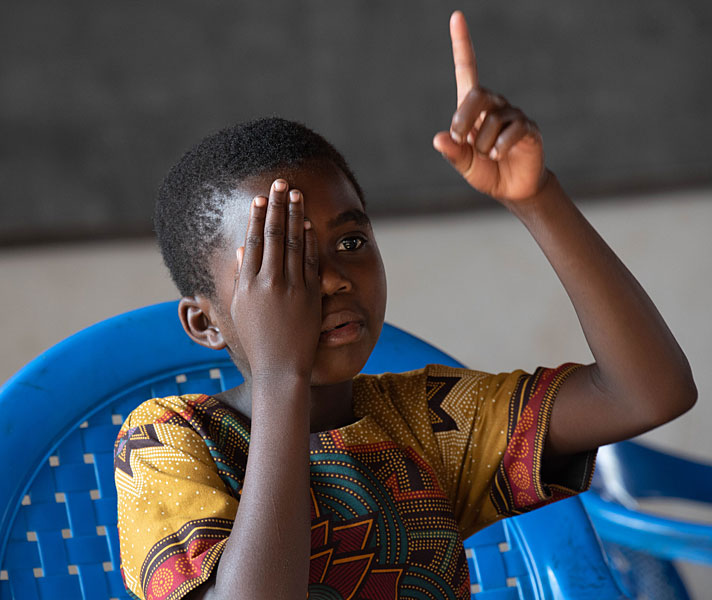
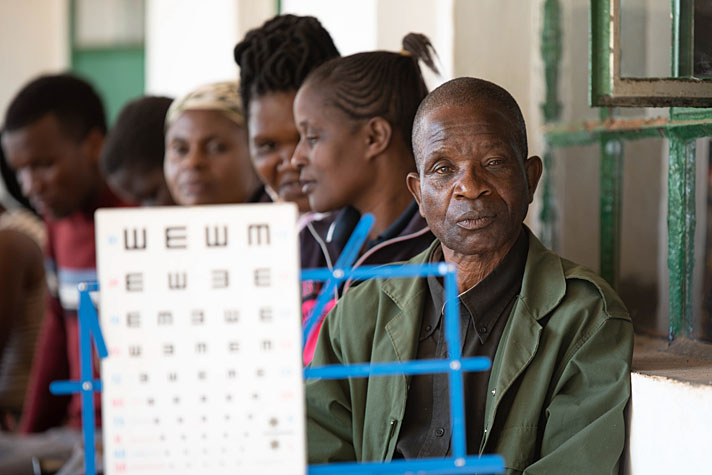
GoodVisionRural
84 percent of the population of Malawi lives in rural areas (national census 2018). The access to affordable eyeglasses in rural Malawi is practically non-existent: optical services are predominantly available in urban areas and prices for eyeglasses by far do not match rural income levels.
Our program GoodVisionRural, currently financed by Else Körner-Fresenius Stiftung, offers highly subsidized eyeglasses to the rural population.
Partners
International Agency for the Prevention of Blindness (IAPB)
As an official member of the International Agency for the Prevention of Blindness (IAPB), OneDollarGlasses actively supports the global WHO Action Plan Vision2020 for the Prevention of Avoidable Blindness and Visual Impairment. In addition to that, OneDollarGlasses is an active participant and contributor to the REWG (Refractive Error Working Group) of IAPB.
Else Kröner-Fresenius-Stiftung
The German Else Kröner-Fresenius-Stiftung is dedicated to advancing medical research as well as medical-humanitarian aid. To date, the foundation has supported some 1,660 projects with a gross outlay of approximately 315 million EURO. OneDollarGlasses has been receiving funding by Else Kröner-Fresenius-Stiftung since 2015.
Ministry of Health and Medical Council of Malawi
OneDollarGlasses has signed a Memorandum of Understanding with the Ministry of Health as well as the Medical Council of Malawi.
Become our Partner
You run or own a hospital, clinic, optical shop or pharmacy and you wish to initiate or expand eyecare services for your customer base?
You work for an (international) organisation and are seeking implementing partners in primary eyecare?
You work for a business and are looking into options for corporate social responsibility?
Please get in touch with us to discuss.
Articles published about us


